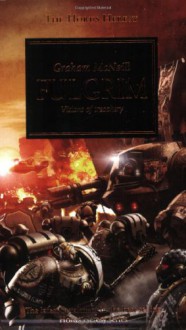
The fall of Fulgrim, the Primarch of the Emperor's Children legion, is tragic and quite dramatic. It is a descent into madness driven by dark forces for a figure that was brilliant and good for starters. And like a good tragedy, you know that there is no stopping the fates once they get going. Fulgrim is the Primarch of the Emperor's Children, one of the legions of the Emperor of Mankind fighting in the Great Crusade to unify the worlds of men. The Emperor's Children pride themselves in their pursuit of perfection. Unlike other legions, they seek the best and most perfect way to go into combat. They are also haughty and proud. We have met some of their members in previous novels. We met Lucius, the skilled but arrogant swordsman that, in my case, I keep waiting to see him get what is coming to him. Saul Tarvitz, the captain of the 10th Company of the Emperor's Children who is seen as nothing more than a line officer. We have seen Saul in previous novels, so if you have read those, you know of his gallant fate. There are also some new people, and naturally, this is Fulgrim's novel, so he stands larger than life. But the tale is not only about Fulgrim; it is also about his bonds of brotherhood. He is close to Ferrus Manus, the Primarch of the Iron Hands. They are so close that in fact they forged weapons for each other at one point. Fulgrim betrays his brother in arms in a truly tragic way full of pathos. This is probably one of the best passages in the book leading then to their inevitable confrontation. And there are confrontations in this book.We get to see the battle of Isstvan III, but McNeill glosses over it, and if you have read the previous novels, then you know of how Horus betrayed and massacred so many Astartes and their military support units. Now a new battle is coming to Isstvan V as legions loyal to the Emperor come to bring reckoning to Horus. But will they succeed in defeating Horus? Or will the wily traitor have yet another trap at hand? I leave that to the readers to find out saying it will be worth reading. I did not give the book that fifth star because the text is a bit drawn out at times. The book clocks in a bit over 500 pages, and I found it a bit too long. I think a little editing could have made for a leaner, and still good, book. The strength of the book lies in the strong tragic sense of the fall of Fulgrim into darkness and his betrayal of Ferrus Manus. This is almost as good as any Shakespearean tragedy. But madness and darkness do not come to Fulgrim alone. His whole fleet, including the remembrancers are affected as well and fall as well into the darkness of Chaos (Chaos still something that we are gradually learning about in the setting of the 31st Millennium). Adding to this, McNeill does use some very good descriptive detail in the passages about the artists which reinforce the impending doom. Overall, the book is a good addition to the series. It has a good blend of intrigue and action, though the intrigue is not as good as previous novels. I think this is no fault of the author. We already know as readers much of what is to happen already; we are seeing it from a different point of view. This on the one hand is interesting, but I can see where some readers might find it repetitive over time. Fulgrim is quite the figure, and his fall is really a tale worth reading. The author does manage to continue the style and feel of previous books, which means there is good consistency. For fans, I think this is a very good book. For those like me discovering the Horus Heresy series, I think this is a good addition and a good read. It is one I recommend, and I will certainly go look for the next one.


 Log in with Facebook
Log in with Facebook 






